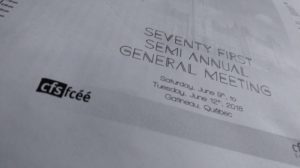The Camosun College Student Society (CCSS) has been expelled from the Canadian Federation of Students (CFS). The CFS held its semi-annual general meeting in Gatineau, Quebec from Saturday, June 9 to Tuesday, June 12; representatives from the CCSS attended the meeting, where a motion passed to expel the CCSS, and all other member locals who are also members of the British Columbia Federation of Students (BCFS), from the CFS. The motion comes after years of tension between BC member locals and the CFS, based in Ontario.
CCSS executive director Michel Turcotte says he is pleased to find a way out of the ongoing conflict between BC member locals and the national student organization.
“When it came to the vote, I didn’t see anybody vote against it,” says Turcotte.
Turcotte says that the room was very quiet after the motion was passed.
“Even amongst the British Columbia representatives there,” says Turcotte. “There wasn’t much of a celebratory mood after the vote; I think everybody realized how big of a thing just happened.”

Turcotte says that after the motion was passed, the CCSS representatives packed up and left the room.
“Once we were expelled from the organization, we no longer met the eligibility criteria to be there,” he says.
The CCSS will continue to collect students’ money that would have went to CFS fees—$2.25 per month, per student, half of which went to the CFS and half of which went to the BCFS, although the CCSS gave the complete amount to the BCFS from 2014 to 2017—until there is a referendum where Camosun students will be able to vote on what happens with the money. Turcotte anticipates that referendum will happen early in the fall.
“One of the biggest issues we have to resolve is the fee issue, so we need to have referendums to allocate our fees,” says Turcotte.
The BCFS wasn’t giving the CFS the Camosun students’ CFS fees because the CFS owes the BCFS $746,204.03, a portion of which is also Camosun student fees. The BCFS is still holding the fees, which is roughly $200,000 of Camosun students’ money.
The BCFS told Nexus in the past that because they are a provincial component of the CFS, the CCSS can remit CFS fees to the BCFS. The CFS claimed that the BCFS could not hold that money and had to remit it to the CFS.
However, CFS treasurer Peyton Veitch, who was unavailable for comment by deadline, recently told Nexus that the CFS will no longer attempt to get that money from the BCFS.
Turcotte says the conflict in the national movement over the last few years has overshadowed much of the good work that has been done.
“Now that we’ve removed most of the fee issue from the table,” he says, “hopefully, we will find ways of cooperating on issues of joint interest and concern.”
Camosun students submitted a petition to the CFS in 2017 in order to hold a referendum to decide on whether or not to defederate from the national organization. However, the CFS says the referendum couldn’t happen because of the fees the BCFS is holding—the CFS considered those Camosun student fees to be outstanding, and a member local can’t defederate with fees outstanding, according to CFS bylaws. In the bylaws, the only other option for a member local to leave is expulsion.
Veitch told Nexus in the past that BC membership accounts for roughly 10 percent of the CFS’ revenue.
Turcotte says abandoning the national student movement would be doing a disservice to students. He says the CCSS will look into possibly joining the Canadian Alliance of Student Associations (CASA) or other student groups.
“If we’re going to make that decision, it’s likely going to be one that’s made before the fall,” says Turcotte. “If the [CCSS] board of directors thought it was appropriate and we were going to join CASA, or explore further membership options related to CASA, I would anticipate that happening at the same time.”
However, the BCFS is going to be doubling its fees, so Camosun students will still be paying the current CFS/BCFS fee of $2.25—slated to rise to $2.29 in September—as well as CASA fees if they join the national student organization.
A spokesperson for the BCFS did not respond to a request for comment by press time.
“The levy for the British Columbia Federation of Students is actually increasing to match the fee currently charged between both organizations,” says Turcotte. “Some student unions have had a referendum to deal with that already, but we have not.”
The CCSS joined the CFS in September of 1992.
